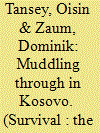| Srl | Item |
| 1 |
ID:
114976


|
|
|
|
|
| Publication |
2011.
|
| Summary/Abstract |
Non-state entities that aspire to statehood are increasingly developing democratic norms and practices, in part to enhance their claims for independence. However, the prospects for democracy in cases of 'problematic sovereignty' are little understood. This article seeks to explore the important but under-explored relationship between sovereignty and democracy, and in particular to assess the extent to which sovereignty is, or is not, a prerequisite for democracy. The article advances two arguments. First, it argues that there is no clear-cut relationship between sovereignty and democracy, as sovereignty is a complex concept that is comprised of several important, and distinct, constituent elements. Second, the article argues that the legal recognition of statehood (international legal sovereignty) is of marginal importance in this area, and should not be seen as a necessary condition for democratic rule. The article examines the process of democratic transition in the non-state entity of Somaliland to provide empirical support.
|
|
|
|
|
|
|
|
|
|
|
|
|
|
|
|
| 2 |
ID:
086164


|
|
|
|
|
| Publication |
2009.
|
| Summary/Abstract |
Kosovo's unilateral declaration of independence of 17 February 2008 has made visible the deep divisions between the United States and its European allies on the one hand, and Russia on the other; divisions that shaped the political dynamics of the Kosovo crisis nine years ago as they do today. The failure to settle the status question through diplomacy has thrown the UN into crisis, leaving the Security Council deadlocked and the international community in Kosovo without direction and momentum. It has led to the de facto partition of Kosovo and control by Belgrade of the Serb-inhabited northern municipalities, and left the international community struggling to define the nature of its engagement. The political divisions that have heightened the problem in Kosovo over the last nine years are unlikely to be resolved soon and, if anything, recent developments have accentuated them. New and creative approaches to stabilising Kosovo and promoting its economic and institutional development are necessary. Current European Union projects in support of the peace process in Northern Ireland might offer a model for such engagement.
|
|
|
|
|
|
|
|
|
|
|
|
|
|
|
|